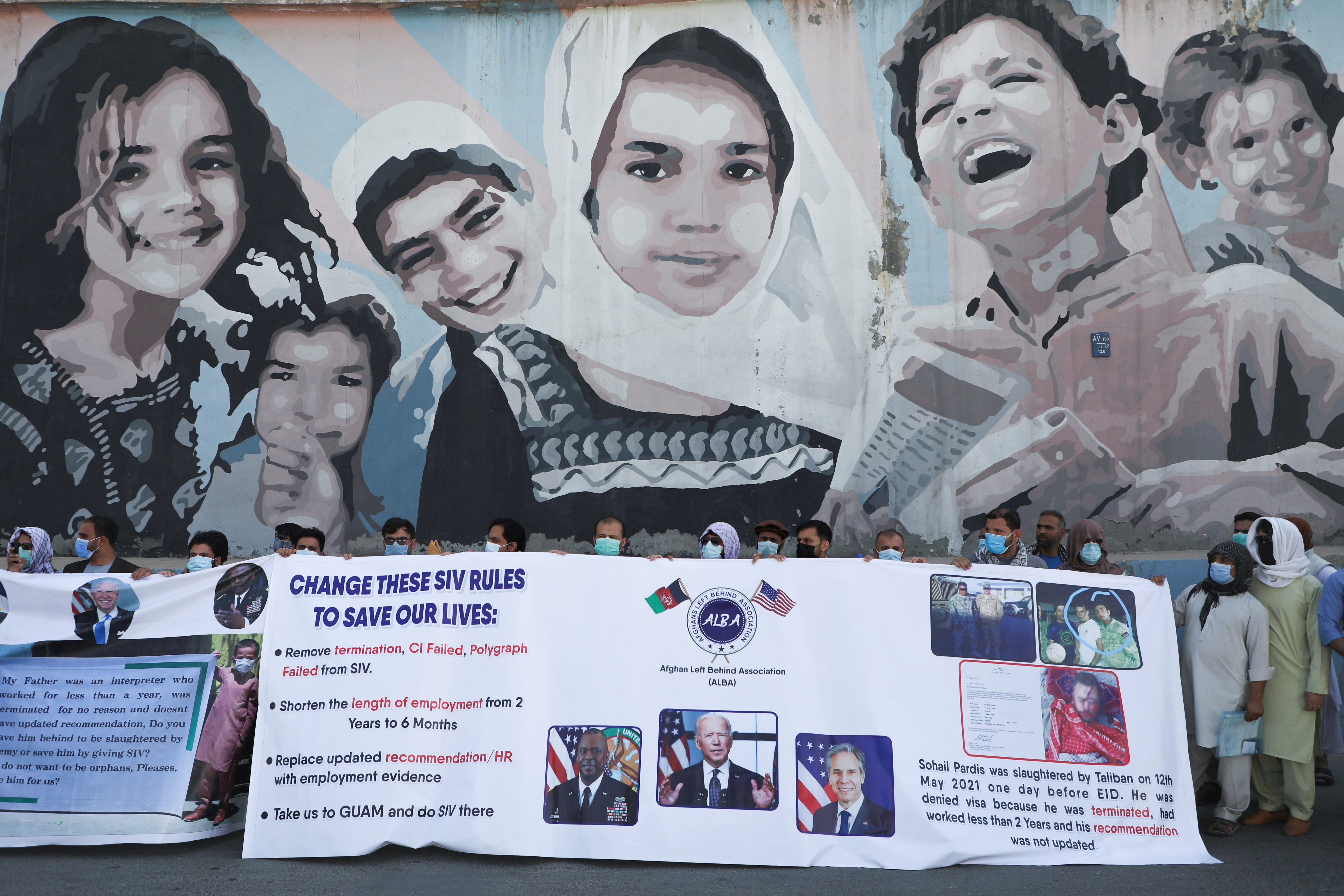US flies 200 Afghan interpreters and family members to Virginia
‘Today is an important milestone as we continue to fulfill our promise to the thousands of Afghan nationals who served shoulder-to-shoulder with American troops and diplomats over the last 20 years in Afghanistan,’ said Joe Biden

Your support helps us to tell the story
From reproductive rights to climate change to Big Tech, The Independent is on the ground when the story is developing. Whether it's investigating the financials of Elon Musk's pro-Trump PAC or producing our latest documentary, 'The A Word', which shines a light on the American women fighting for reproductive rights, we know how important it is to parse out the facts from the messaging.
At such a critical moment in US history, we need reporters on the ground. Your donation allows us to keep sending journalists to speak to both sides of the story.
The Independent is trusted by Americans across the entire political spectrum. And unlike many other quality news outlets, we choose not to lock Americans out of our reporting and analysis with paywalls. We believe quality journalism should be available to everyone, paid for by those who can afford it.
Your support makes all the difference.About 200 Afghan interpreters and their families arrived in Virginia on Friday, the first evacuations of thousands imperiled because of their work with the United States in Afghanistan as the Taliban gains control of more territory nationwide, US officials said Friday.
The first flight departed Kabul with Afghans on their first leg of travel to Fort Lee, where they will finish the last rounds of processing over the next several days before being resettled across the country.
“Today is an important milestone as we continue to fulfill our promise to the thousands of Afghan nationals who served shoulder-to-shoulder with American troops and diplomats over the last 20 years in Afghanistan,” President Joe Biden said in a statement.
The Afghans are part of a broader group of about 2,500 who are furthest along in the special immigrant visa process and who will arrive in subsequent flights, said Russell E. Travers, a senior adviser at the National Security Council, in a call with Biden administration officials Thursday.
The evacuees escaped the clutches of Taliban militants who have targeted interpreters, in some cases killing them as retribution for their work with US troops on the front lines and as crucial guides for diplomats and aid workers. The urgency has mounted in recent months as the Taliban has wrested control of wide swaths of the country from the Afghan government, including its takeover of about half the country’s district centers, US officials have said.
“These arrivals are just the first of many as we work quickly to relocate [Special Immigrant Visa]-eligible Afghans out of harm’s way-to the United States, to US facilities abroad, or to third countries-so that they can wait in safety while they finish their visa applications,” Mr Biden said.
But the initial flight is a small fraction of thousands of Afghans who have spent years in bureaucratic limbo waiting on their visas to be approved after the rigorous and, many say, at times confounding screening process.
About 20,000 Afghans had applied for the special immigrant visa as of 15 July, according to the White House. That number does not include family members; a US government official said the total number of people in the applicant pipeline including family members could be as high as 100,000.
That is more than the roughly 74,000 Afghans resettled in the program since it was implemented in 2009, according to the State Department.
The Senate on Thursday cleared more than $1 billion (£717 million) to pay for the evacuations, including transportation and housing provided by the Defense and State departments. The bill would also lessen requirements for applicants and allow 8,000 more visas on top of the 26,500 currently allocated for the program. President Biden is expected to sign the bill.
Underscoring the complexity of the effort, dubbed Operation Allies Refuge, is the fact that applicants live all over Afghanistan, many in Taliban-controlled or -contested territory.
The Association of Wartime Allies, an interpreter advocacy group, estimates about half of applicants still waiting live outside Kabul. Many roads outside the capital are dotted with Taliban checkpoints. The Afghan air force, beleaguered and overtaxed in battles with the militants, does not seem capable of ferrying applicants, said Matt Zeller, a former Army officer and board chair of the group.
The reality is some of these people are going to die. Why didn’t the US military evacuate them when we had the ability?” asked Mr Zeller, who said Biden administration officials ignored his warnings in January to prepare for mass evacuations.
Tracey Jacobson, the State Department’s Afghanistan Coordination Task Force director, told reporters on the call Thursday that the United States had no ability to bring applicants to the capital or house them while they wait for clearance to fly.
Other applicants not as far along in the process will be moved to a third country for safe processing, Ms Jacobson said.
Advocates and interpreters have said the evacuation so far has been beset by confusion and tension.
One former interpreter, who said he worked with a US contractor for eight years in Kandahar, including time translating for US troops training Afghan soldiers, said he was notified to pick up his passport but that he had received no further information.
The former interpreter, who spoke on the condition of anonymity out of fear of retribution from the Taliban, watched news of the initial flights trickle out while waiting to see if he, his wife and six children would be among the next wave.
“Pray for me,” he texted a reporter on WhatsApp. “Very tired … faced with too much problems to get out of here.”
The Washington Post
Join our commenting forum
Join thought-provoking conversations, follow other Independent readers and see their replies
Comments